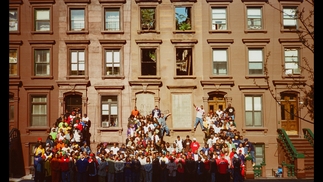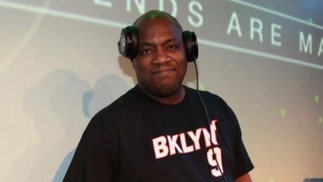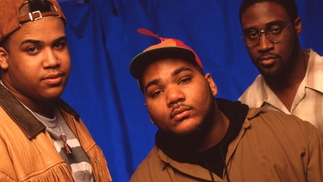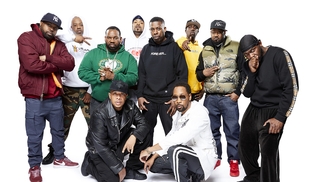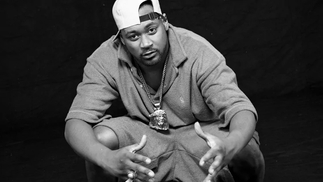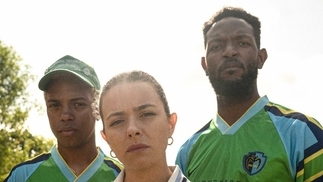Q&A: MR BEATNICK
An insight into house sophistication

Nick Wilson is an inveterate crate-digger. There's little he enjoys more than delving in the dusty racks of record emporiums to unearth rich seams of gold. Records that to others are forgotten relics are the key components of his tunes as Mr Beatnick. Inspirations, samples, tunes from all manner of styles across the decades inform his productions. His influences are manifold, and as his name suggests he “nicks” beats. But what this musical magpie makes with these shiny trinkets is astonishing.
His first appearances on wax marked him as a hip-hop nut. But 'I Know All the Bitches' featuring soulstress Ahu on Altered Vibes really announced the London producer's presence in 2008, a melancholy, autumnal downtempo bump laced with spacey synths and an otherworldly feel. 'The Fourth Day' EP mined a similar source, then he went quiet. But in 2011, the 'Synthetes' EP dropped and things changed.
The title track, a hugely emotive meld of soaring orchestral strings, house beats and wiggling vintage synths laden with intricate subtle details, sounded like nothing else. Part symphonic '70s soul, part analogue Detroit techno, it mixed discrete ideas and sounds together in a unique way. Feted by Paul Woolford, Jimpster and everyone in-between, it marked a change of course. 'Sun Goddess' — an oblique nod to the Ramsey Lewis/Earth, Wind & Fire track only in name — was a bumping house cut with a killer funkin' electronic bassline, shimmering keys and distant oases rippling with mirages of filmic majesty that fade into squiggling acid grooves.
'Shifting Sands', a Balearic oddity of melting, optimistic analogue key riffs atop languid FX and lolloping 4/4s was also contained on that EP, while this year's 'Parallax Scroll' is a tribute to early '90s house and hardcore with its anthemic key riffs and galloping breakbeat choppage. All the cuts from these EPs, and a few new ones are contained on 'The Synthetes Trilogy', his debut album for Semtek's always on-point Don't Be Afraid label, and it's no exaggeration to say it's one of this writers favourite records of recent times.
"Mr. Beatnick is living proof that with age comes expertise and with experience comes wisdom,” says label boss Semtek. “He is one of the few producers operating today who continues to further the mastery of his craft as a record maker with every release."
It's hard to argue with that. What better time to interview Mr Beatnick, then?
Your earlier productions are more hip-hop-based. Is that the root of your love of music?
“Definitely. It does come back a lot to that. I'm just really big into the digging thing really, the process whereby hip-hop records showed you about records from the past. I love that cyclical thing of drawing from music from the past and bringing it full circle, re-contextualising it. It really all started for me with things like Run DMC 'Tougher Than Leather', Public Enemy. I remember listening to cassette tapes of things like 'De La Soul Is Dead' and '3 Feet High and Rising', and being struck by, especially with Prince Paul's work, it was so colourful and psychedelic, the way he drew from fragments from all over. It made my ears prick up, thinking I would love to know what some of those bits are that he's referencing. The joy of collecting records and having that kind of approach is that as the years go by, you'll still find things, like, 'that's that record that I heard when I was a kid', but it's taken you 20 years to stumble across it.”
'Synthetes' was your breakthrough track and represented a real change musically. Had you become disillusioned to an extent with hip-hop?
“It's a good question. I was opening for Madlib last night. My love for hip-hop hasn't changed and it's still there in the core of me. But I think the honest truth is in London, at the time of making the records I was making, like 'I Know All the Bitches' with Ahu, and some other stuff in that beats scene, I would say I was quite disillusioned, simply because with the dominance of what was happening in LA with Flying Lotus and those guys, not to denigrate them in any way, but aesthetically and in terms of the way the world saw the music, a lot of those guys were ahead. In London there were a lot of people in the scene I was involved in experimenting along those lines. But we never seemed to have a party we could play at where people would actually dance to that music, we never had a centrifugal force.
“What happened with me was I drifted, started going out less, struggled to find parties that I enjoyed going to, and then the music became something a lot more introspective and personal, and when that starts to happen to you, I think it happens a lot as an artist, you move through different phases, it's usually those moments when you have a bit of clarity.
“You're writing for yourself to entertain yourself. And I think at that moment is when I started to write songs like 'Synthetes' and 'Sun Goddess', that's how that music emerged out of me I guess. It's been a wonderful experience because I feel the music I make now is so much more honest and so much more coming from my heart.”
Your house music seems like a real blend of influences, from organic instrumentation to more synthetic electronic sounds. Does a kind of sample spotting, crate digging mentality carry over into your appreciation of and production of house? Is it so different from rap?
“Yeah. Without getting too poncey about things, a lot of this process is about creating narratives and how you link things together. There is a holistic thing, taking some really disparate things and fitting them all together into one continuous mood. That's one thing with the album, when it came to digging through the archives and assembling it in the way that I did in the end, it was trying to find out some way to make it flow really consistently. When you're listening to it you're really hearing lots of different things, bits of old jazz records, old new wave and prog, it's a bit of everything but the kitchen sink. The challenge there is how to bring things together so it will have this one mood.
I really like that kind of deep, reflective, contemplative, spiritual kind of mood. If you want to talk about house music for example, house is a really great form to utilise to bring all these things into cos it's kind of like a really fixed frame, a frame that just about anything can go into. I think that's partly why I ended up settling working at slightly faster tempos than my earlier work and why I switched to going with 4/4 kick drums and trying to do something that kind of works on the dancefloor. But at the same time it's kind of a home listening record. Using that 4/4 language allows you to make records that do things that you wouldn't perhaps expect in a dancefloor way.
I think there's a bit of subversion in there really. I always liked the way someone like Arthur Russell approached disco. People who clearly came from a more avant-garde background but try having fun with the dancefloor format. That's really what I try to do with the trilogy, to have things that were DJ friendly enough to play out, but you can sit at home and listen to it, it's a little bit deeper.”
So you subvert the rigidity of the form within while showing love for it?
“Absolutely. Those are some of the greatest records.Those are the ones you come back to, or I come back to. I don't want to say musical cos it's all music, but those records that are a little bit richer and a little bit finer and have that little bit of extra care and detail and love in them. I think that's the difference between something that's made in the now and something that's made to last a little bit longer. I'm concerned with trying to make something that will sit on the shelf that you'll be able to rediscover in a few years in the same way that I find things and listen to old records and think 'Wow, is that really made in 1991 or 1973?' That timeless quality that projects beyond when it was actually made.”
Tunes like 'Shifting Sands' have slightly offbeat key riffs, sounding un-quantised. More raw and live-sounding. Do you use analogue kit?
“Yes, there's a lot of analogue, it involves a lot of reel-to-reel at different stages of the process. A lot of it is hardware. You're quite right about the lack of quantisation, all of that stuff comes from my hip-hop background. You learn when you start to make hip-hop tracks to use your own manual timing. And trying to put everything on the grid never really worked with me. I struggled with it.
When I learned to abandon the grid... if you ever imported one of my tracks into a sequencer and tried to look at where it all sits, you'll notice that everything is completely off. I was doing some work with Kirk Degiorgio and I sent him some multi-tracks and he wrote back saying, 'These are all over the place, what's wrong with your soundcard?' I don't seem to program anything on beat. I think it's so much easier to get a soulful swing and vibe out of a track if you use the inherent playing and natural timing. It's a bit like what Matthew Herbert said about mistakes. The good bits are the bits where you screw up a bit.”
You seem especially fond of string orchestra sounds, as on 'Synthetes' itself. That element seems to ground things in a more soulful realm. What makes strings so powerful?
“The string thing is really crucial to me. I've always been really captivated by the richness and harmonic strength of strings. The feeling of hearing strings on the dancefloor is second to none, I'm sure we've all had that moment when someone has played a Chic record in the club and you finally hear it on a decent system. I remember one time I was at a party and they had a really love system in and someone played Crusaders 'Street Life', and to hear the crescendoes and rolls of the strings, to hear them on a massive system it lifts the dancefloor in a way I don't think any electronic sound can.
“I guess organic and synthetic sounds both have their strengths and weaknesses.
That's why the track 'Symbiosis' is called that, because the two sides, a symbiotic relationship is two things where one element is dependent on the other element. That record is me trying to experiment with a balance between the two. If you look at old techno records, those guys were aspiring to make old disco records, really transcendent organic-sounding records, but they're doing it with really cheap and nasty technology. And I like that the synthesisers are aspiring to be more soulful than they ever can actually be because they're still a machine. I've always been very influenced by records that sample string parts as well, like Trackheadz 'Your Music', Pepe Bradock 'Deep Burnt', Octave One, 'Blackwater'. There's something about hearing those records on the floor, their richness is very inspiring. It's also really fun to play around with when you're making the track.”
